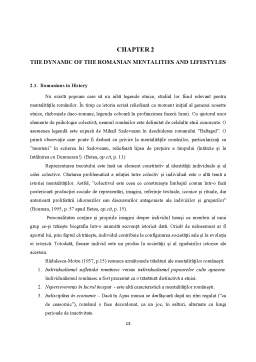Extras din proiect
CHAPTER 1
MENTALITIES AND LIFESTYLES - LAYING OUT THE TERRITORY
1.1. Definitions and classifications
Etymologically speaking, ˮmentalities” comes from the adjective ˮmental”, which means spirit, intellect, deriving from the Latin ˮmens” (mind). The word ˮmental” was first introduced in the vocabulary of French language in the middle of the 14th century and in the middle of the 19th century there appeared its derivate ˮmentalité” (mentalities) which was borrowed from the English ˮmentality”, initially meaning ˮthe way a nation or a group of persons thinks and feels ” (Mandrou, 1969, p.270-272).
Starting with the 18th century, the term ˮmentality” began to gain an important place in the common language, although it was used very rarely. Specialists think this term can be explained as ˮthe main way a society thinks in a certain moment” (Niță, 2020, p. 2).
Over the time, several authors defined ˮmentalities” in different ways. Thus, Jacques Le Goff thought mentalities were ˮa set of ready-made ideas which are spontaneously expressed by individuals, in a certain urban environment and a certain period” (Ibidem). Miche Vovelle thought ˮmentalities” include ˮall the forms of the cultural expressions, from those specific to the savants to the unconscious level of the collective sensitivity, mirrored by the most everyday attitudes, behaviors and representations of the popular characteristics”. (Ibidem). For Hagen Schulze ˮmentalities” are ˮthe image society builds about itself, catching the social norms and axioms, as well as universes of collective meanings and paradigms of legitimating” (Ibidem).
Some researchers associate mentalities to ˮthe junction point between individual and collective, between structural and circumstantial, between unconscious and intentional, between particular and general” (Le Goff, 1974, pp. 110-113). It is therefore important to note that mentalities manifests itself at the social level in the form of opinions, beliefs and prejudices. But how the mentalities appears? Before conditioning the perception of realities and determining the social behavior, mentalities arises in the individual, because all the opinions, thoughts and prejudices are connected to the physical structure and activity of that person.
ˮEverything that is deeply rooted, born from improvisation and reflex, automatic gestures, unthought-of words ( ), come from far away and confirm their long and deep infiltration in society’s systems of thinking” (ib.), and ˮthus, inertia becomes a vital historical force” (Gavreliuc, 2003, p. 28). Consequently, at the beginning of the 20th century, the term ˮmentalities” acquired a pejorative connotation of ˮmentally retard”, meaning ˮdeficiency”.
Mentalities was discussed also from the ethnologic perspective, meaning a type of reflex of the primitives, a collective phenomenon which excludes individual psyche, characterized by involuntary automatisms (Lévy-Bruhl, 1922).
In order to analyze the way mentalities influences certain attitudes and behaviors that belong to the lifestyle sphere, it is important to highlight the main types of mentalities as they were identified by several researchers.
From the point of view of the direction of the mentalities , there are 2 types of mentalities:
- survival-oriented mentalities;
- success-oriented mentalities.
Survival-oriented mentalities means finding one’s safety in someone else, because he or she does not trust his own powers. That is why safety means identifying the opportunities and achievements in relationships with other persons. These persons accept any compromise; cling to any relationship, regardless of the risks they are exposed of. The mentality of these people is based on beliefs such as: ˮhe passed the exam because he pulled some strings” or ˮhe entered the public system because he had some connections”.
Success-oriented mentalities means having confidence in one’s own strengths and
trusting that he or she can successfully face life's challenges. Success-oriented persons invest in their personal and professional growth, they are perseverant and determined. They are aware of the fact that their success depends only on the abilities that they are constantly developing, to learn from the mistakes of their own or of others to become wiser and not to accept to become dependent on someone or something. They develop healthy and functional relationships with other persons; they do not accept compromises, really cherishing their own freedom. They do not let themselves influenced by the collective mentalities, believing in their own truth. The beliefs that are at the base of the mentalities of these persons are saying like ˮknowledge is power”. (Niță, 2020, p. 2).
Preview document
Conținut arhivă zip
- Mentalitati si stiluri de viata in Romania.docx

































